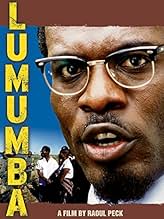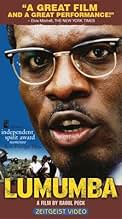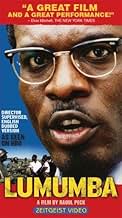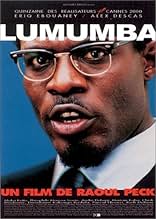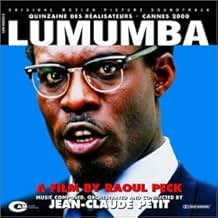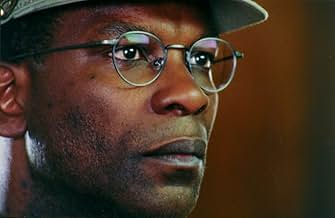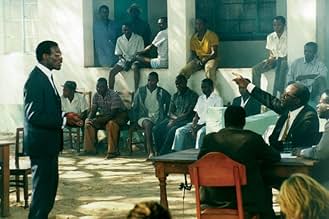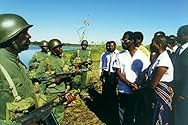CALIFICACIÓN DE IMDb
7.2/10
2.2 k
TU CALIFICACIÓN
Agrega una trama en tu idiomaThe true story of controversial leader of independent Congo Patrice Lumumba.The true story of controversial leader of independent Congo Patrice Lumumba.The true story of controversial leader of independent Congo Patrice Lumumba.
- Dirección
- Guionistas
- Elenco
- Premios
- 3 premios ganados y 8 nominaciones en total
Théophile Sowié
- Maurice Mpolo
- (as Théophile Moussa Sowie)
Makena Diop
- Thomas Kanza
- (as Oumar Diop Makena)
Dieudonné Kabongo
- Godefroid Munungo
- (as Dieudonné Kabongo Bashila)
Pascal N'Zonzi
- Moïse Tshombe
- (as Pascal Nzonzi)
- Dirección
- Guionistas
- Todo el elenco y el equipo
- Producción, taquilla y más en IMDbPro
Opiniones destacadas
I was a pre-teen when news of Lumumba's assassination hit the news so I very vaguely recall at the time it was sad a leader who tried to shuck the reigns of colonialization was killed for efforts towards independence.
There is woefully insufficient time in a 2 hour movie to completely explain the whos whys and wherefores of a political assassination. Suffice to say the victors write the history and even if the truth were portrayed adequately, who's truth would it be? As the character Lumumba says in the movie, he came 50 years too early.
I found the story fast paced with good production values. It mirrored the all too brief time in power for a promising African leader, and there is a dearth of them lately. That continent still suffers a vacuum in its leadership, a state that will take another century to rectify. The film and life of Lumumba is a lesson of how badly things can go wrong in a climate of conflicting objectives and numerous parties and forces acting in a volatile setting. Congo had just gained independence and tribal rivalry reared its head very quickly. It is suggested for example that Lumumba seek sanctuary in the province of Katanga, where months before he had been refused landing rights in a flight to visit the troubled area. Politics makes strange bedfellows.
The time of the 1960s was the height of the cold war and Lumumba's courting of Soviet aid to fast track his country did not win any favours. No doubt the superpower USA had at least some hand in his death, much the same as Ngo Dhin Diem in Vietnam around the same time. Attempts to assassinate Fidel Castro at that time are also well documented so it may be some measure of just desserts that Kennedy met his end with an assassin's bullet.
Read up on that period of history then watch the movie to get additional value for the time you invest, and then you will be prepared to better understand contemporary events in far off places when national interests are at stake. Oil, diamonds, bauxite, coffee, whatever; liberty always seems to take a back seat when these interests get the ear of the powers that be.
Realism in the film is reinforced with the french dialog. I also understood the subtleties having studied military coups in university under a black professor who came from Nigeria.
There is woefully insufficient time in a 2 hour movie to completely explain the whos whys and wherefores of a political assassination. Suffice to say the victors write the history and even if the truth were portrayed adequately, who's truth would it be? As the character Lumumba says in the movie, he came 50 years too early.
I found the story fast paced with good production values. It mirrored the all too brief time in power for a promising African leader, and there is a dearth of them lately. That continent still suffers a vacuum in its leadership, a state that will take another century to rectify. The film and life of Lumumba is a lesson of how badly things can go wrong in a climate of conflicting objectives and numerous parties and forces acting in a volatile setting. Congo had just gained independence and tribal rivalry reared its head very quickly. It is suggested for example that Lumumba seek sanctuary in the province of Katanga, where months before he had been refused landing rights in a flight to visit the troubled area. Politics makes strange bedfellows.
The time of the 1960s was the height of the cold war and Lumumba's courting of Soviet aid to fast track his country did not win any favours. No doubt the superpower USA had at least some hand in his death, much the same as Ngo Dhin Diem in Vietnam around the same time. Attempts to assassinate Fidel Castro at that time are also well documented so it may be some measure of just desserts that Kennedy met his end with an assassin's bullet.
Read up on that period of history then watch the movie to get additional value for the time you invest, and then you will be prepared to better understand contemporary events in far off places when national interests are at stake. Oil, diamonds, bauxite, coffee, whatever; liberty always seems to take a back seat when these interests get the ear of the powers that be.
Realism in the film is reinforced with the french dialog. I also understood the subtleties having studied military coups in university under a black professor who came from Nigeria.
This movie was intended to explore the powers that resisted and ultimately ended Lumumba's political movement in the Congo with historical accuracy. Although it goes to great lengths to meet that end, it falls horribly short in two major ways. One, the CIA is mentioned just one time. Two, JFK is portrayed as though he authorized Mubutu's "offer" of a military takeover. This is despite the fact that Lumumba was killed three days before JFK became president! With the information now available (read JFK: Ordeal in Africa by Richard Mahoney), there is no doubt that the Dulles brothers using the CIA were chiefly responsible for Lumumba's assassination. Kennedy was heartbroken by the news and understood and advocated for a united Congo much like Lumumba did, opposing Eisenhower and the CIA. Not to mention the Belgians and British. Although one could argue these points do not have a major impact on the movie, they are critical to understanding not just the Congo during that period, but the intense internal conflict in the United States between large interests (Wall Street represented by CIA) and JFK's vision for the world (third world independence and development, anti-imperialism).
9imxo
To answer the question of a previous reviewer who asked the name of the U.S. official mentioned in "Lumumba", the name of the character is "Mr. Carlucci." Frank Carlucci is reported as having been at that time Second Secretary at the U.S. Embassy in the Congo. Subsequently, among other assignments, he was appointed U.S. Ambassador to Portugal, Deputy Director of the Central Intelligence Agency, Secretary of Defense, and is now the Chairman of the Carlyle Group. It's hardly surprising that Carlucci's biographical sketch on his www.carlylegroup.com web site fails to credit his service in the Belgian Congo. If his name was deliberately censored from the HBO version of "Lumumba" it may have been to avoid the possibility of HBO's being sued in U.S. courts. Carlucci's name, however, is clearly mentioned in the theatre version of "Lumumba" that I saw recently. In the event, I expect that he would deny any involvement in Lumumba's murder.
Others have commented on the evenhandedness with which the film "Lumumba" treats the parties concerned: Lumumba-supporters, other Congolese, even Belgians. A somewhat more sinister view emerges, I think, from the BBC documentary entitled "Who Killed Lumumba?", based on the book "The Murder of Lumumba" by Belgian historian Ludo de Witte. When examined closely, these films demonstrate that the fate of Lumumba and the history of the Congo is not just a matter of black and white. Only Lumumba's murderers believe that.
Others have commented on the evenhandedness with which the film "Lumumba" treats the parties concerned: Lumumba-supporters, other Congolese, even Belgians. A somewhat more sinister view emerges, I think, from the BBC documentary entitled "Who Killed Lumumba?", based on the book "The Murder of Lumumba" by Belgian historian Ludo de Witte. When examined closely, these films demonstrate that the fate of Lumumba and the history of the Congo is not just a matter of black and white. Only Lumumba's murderers believe that.
I just saw this movie last night, 2/21/02, on HBO TV in New York and noticed a fascinating and rare bit of censorship within it. In one late scene in the movie when Congo politicians and 1-2 Americans meet around table and vote whether Lumumba is to be captured/killed, the apparent American, perhaps a CIA officer, is addressed by Gen. Mobutu and asked how he wants to vote. But the American's name uttered by Mobutu is bleeped out in the televised version I saw and heard. Then in the film's final credits, this same character's name is masked over and appears only as "Mr......" played by actor Dennis Thatcher. So what IS the name of the mysterious man, no doubt too accurately identified, in this movie, airing on American TV some 2 years after it was made.
This film has both people that enjoy and people that loathe it. However I was struck by the fact at how many non-Africans had seen and commented on this film. Here we see a massive problem arising.
Firstly: It is a fact that African history was passed along orally and the only real written history in Africa was created with the advent of missionaries on the continent. To this day there are more books written about African history by non-Africans than there have been of Africans. This means that Africa has seldom, if ever, been presented the way it sees itself. "Lumumba" is a film made by an African filmmaker, shot on the African continent with African actors and yet we see Americans and Europeans commenting on it!
The fact is that most of these people have an imagined history of Africa. On user commented that the USA was 'forced' to intervene in Congo, because "Lumumba" called in the USSR to help out his army. What the hell was the USA doing in Africa in the first place? And I answer; they were securing their economic interests. How dare outside powers even allow to excuse their intervention in the African continent, when they are in majority at fault for the situation many African countries find themselves in today.
Secondly: There were a couple of comments on the acting and style that this film was made in. Many people don't realize that the entire world does not exclusively copy the Hollywood model. We see different characters in different environments. "Lumumba" shows a different view on an African hero and even though this view is not entirely accurate, what view ever is.
So don't watch and judge this film according to your standards, because you most likely have no idea what you are talking about. Rather than being prejudiced towards the film, just let it talk to you and present you with its argument...for a change!
Firstly: It is a fact that African history was passed along orally and the only real written history in Africa was created with the advent of missionaries on the continent. To this day there are more books written about African history by non-Africans than there have been of Africans. This means that Africa has seldom, if ever, been presented the way it sees itself. "Lumumba" is a film made by an African filmmaker, shot on the African continent with African actors and yet we see Americans and Europeans commenting on it!
The fact is that most of these people have an imagined history of Africa. On user commented that the USA was 'forced' to intervene in Congo, because "Lumumba" called in the USSR to help out his army. What the hell was the USA doing in Africa in the first place? And I answer; they were securing their economic interests. How dare outside powers even allow to excuse their intervention in the African continent, when they are in majority at fault for the situation many African countries find themselves in today.
Secondly: There were a couple of comments on the acting and style that this film was made in. Many people don't realize that the entire world does not exclusively copy the Hollywood model. We see different characters in different environments. "Lumumba" shows a different view on an African hero and even though this view is not entirely accurate, what view ever is.
So don't watch and judge this film according to your standards, because you most likely have no idea what you are talking about. Rather than being prejudiced towards the film, just let it talk to you and present you with its argument...for a change!
¿Sabías que…?
- TriviaRaoul Peck had already made a film about Lumumba in 1992: the documentary Lumumba: La mort du prophète (1991).
- ErroresWhen Lumumba arrives at Brussels airport for a round table conference, an Airbus A300 and Lockheed C-141 Starlifter can clearly be seen. Both of these aircraft had not yet entered into service and flown at the time the event took place in 1960. Airbus A300 made its first flight on 28 October 1972, twelve years later; and Lockheed C-141 Starlifter made its first flight on 17 December 1963, three years after the conference.
- Citas
[first lines]
Patrice Émery Lumumba: [voice over narration] You never knew about that night in Katanga. No one was to know.
- Versiones alternativasFrank Carlucci, who was second secretary at the U.S. embassy in the Congo at the time of Lumumba's assassination, is portrayed in one scene discussing the murder with U.S. Ambassador Clare Timberlake and several Belgian and Congolese officials. Carlucci threatened to sue U.S. distributor Zeitgeist Films if his name was not removed from the movie. Zeitgeist was too small to fight any potential lawsuit, so all non-theatrical U.S. releases of the film (including the version shown on HBO and potential VHS and DVD releases) have Carlucci's name bleeped from the dialogue and masked in the closing credits.
- ConexionesFeatured in Exterminate All the Brutes: Who the F*** is Columbus? (2021)
Selecciones populares
Inicia sesión para calificar y agrega a la lista de videos para obtener recomendaciones personalizadas
- How long is Lumumba?Con tecnología de Alexa
Detalles
Taquilla
- Total en EE. UU. y Canadá
- USD 352,296
- Total a nivel mundial
- USD 352,296
- Tiempo de ejecución1 hora 55 minutos
- Mezcla de sonido
Contribuir a esta página
Sugiere una edición o agrega el contenido que falta

Principales brechas de datos
By what name was Lumumba (2000) officially released in Canada in English?
Responda

